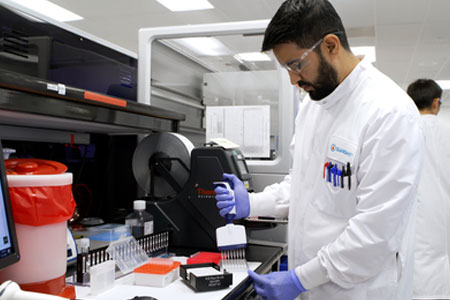Guardant Health Inc, a leading precision oncology company, announced that results from the ECLIPSE study showing the effectiveness of its ShieldTM blood test for detecting colorectal cancer (CRC) in average-risk adults will be published in the March 14 issue of The New England Journal of Medicine.
“Over 50 million eligible Americans do not get recommended screenings for colorectal cancer, partly because current screening methods are inconvenient or unpleasant,” said AmirAli Talasaz, Guardant Health co-CEO. “We believe the publication of the ECLIPSE study in The New England Journal of Medicine, one of the world’s leading medical journals, is an endorsement of the quality of our clinical data and the potential value of the Shield test. We are confident that offering an accurate blood test has the potential to significantly reduce preventable colorectal cancer deaths.”
One of the largest studies of its kind, ECLIPSE (Evaluation of ctDNA LUNAR Assay In an Average Patient Screening Episode) is a 20,000+-patient registrational study to evaluate the performance of Shield compared to a screening colonoscopy. The Shield test detects colorectal cancer signals in the bloodstream from DNA that is shed by tumors, called circulating tumor DNA (ctDNA).
These results are on par with the performance of other guideline-recommended non-invasive screening modalities, where overall sensitivity in detecting colorectal cancer ranges from 74% to 92%.1
“More than 3 out of 4 Americans who die from colorectal cancer are not up to date with their recommended screening,2 highlighting the need for a more convenient and less invasive screening method that can overcome barriers associated with traditional options,” said Daniel Chung, MD, gastroenterologist at Massachusetts General Hospital and Professor of Medicine at Harvard Medical School. “The ECLIPSE study results published today support the use of a blood test as a screening option that could help overcome these barriers and improve CRC screening rates."
Publication of ECLIPSE follows Guardant Health’s submission of its premarket approval (PMA) application to the U. S. Food and Drug Administration (FDA) for Shield, which included key data points from the study. Since the launch of the lab-developed version of the Shield test in May 2022, it has been used by more than 20,000 people and more than 90% of patients who were prescribed the test in the real-world clinical setting completed it. One recent study showed that CRC screening rates tripled among adults who had declined prior CRC screening when they were offered Shield. The test’s sensitivity in detecting CRC, combined with this real-world adherence, suggests that Shield has the potential to detect more CRCs at a curable stage than traditional screening methods.3,4,5,6
“Colorectal cancer is highly treatable if caught in the early stages, yet more than 50 million people in the U.S. are still not completing their recommended screening with the methods available today,” said Chris Evans, president of the Colon Cancer Coalition. “This publication gets us one step closer to having an additional option to offer patients – one that is both convenient and accessible—and will help us close the screening gap.”
Colorectal cancer is the second-leading cause of cancer deaths in the U.S. The American Cancer Society estimates that more than 150,000 people will be diagnosed with CRC in 20247 and it is expected to become the leading cause of cancer-related deaths by 2030 in adults aged 20-49.8 More than 75% of people who die from CRC are not up to date with recommended screening,9 often due to the perception that current methods such as colonoscopy or stool-based tests are invasive, time-consuming and inconvenient. Early detection, however, is crucial. When colon cancer is found at an early stage before it has spread, the 5-year relative survival rate is 91%. If the cancer has spread to distant parts of the body, the 5-year survival rate is 13%.
“The results of the study are a promising step toward developing more convenient tools to detect colorectal cancer early while it is more easily treated,” said corresponding author William M. Grady, MD, a gastroenterologist at Fred Hutchinson Cancer Center. “The test, which has an accuracy rate for colon cancer detection similar to stool tests used for early detection of cancer, could offer an alternative for patients who may otherwise decline current screening options."
About the ECLIPSE study
ECLIPSE is a prospective registrational study to evaluate the performance of Guardant Health’s blood test in detecting signs of CRC compared to a screening colonoscopy in average-risk adults between the ages of 45 and 84 from across the U.S. The ECLIPSE study included more than 200 clinical trial sites in rural and urban communities across 34 states. Study data includes 12% Black, 13% Hispanic and 7% Asian American populations. Enrollment among Black Americans was above average for a clinical trial, which is important given the disproportionate impact of CRC on the Black community.10
About Shield
The Shield test for colorectal cancer screening is commercially available for eligible individuals by prescription only through healthcare professionals. This LDT (Laboratory Developed Test) is intended to be complementary to, and not a replacement for, current recommended CRC screening methods. A negative result does not rule out the presence of cancer. Patients with an abnormal blood-based screening result should be referred for a diagnostic colonoscopic evaluation.
More information about the Shield test is available at www.bloodbasedscreening.com
For more details, visit: www.guardanthealth.com


